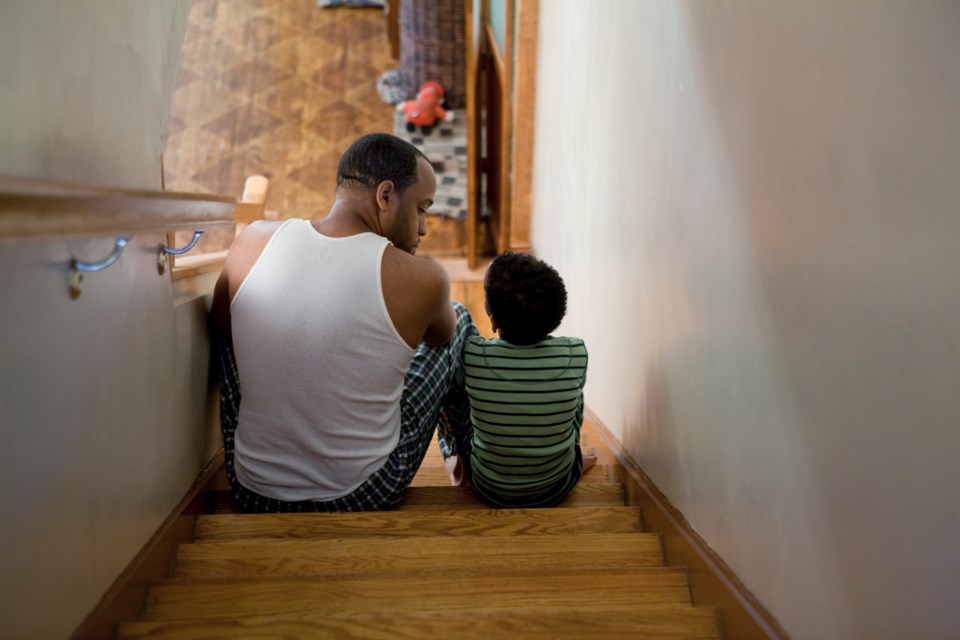Dear Ellie: My husband and I were very good friends with another couple for nine years. Within the next year, the wife moved away to be with another woman, and my husband started an affair which led to our divorce.
Eighteen months later, the man invited me to have dinner together and “a chat.”
I expected a sob story, so I spoke first and immediately said that I was fully adjusted to my divorce, and, in fact, believed that my ex and his new partner were better suited than he and I had ever been.
The man smiled broadly and said he fully accepted that his ex-wife had to live her authentic self as a lesbian, and he still wishes her well and they keep in contact.
I moved in with him six months later. My daughter, 21, who lives with her boyfriend, accepted this relationship because she saw that I was more relaxed and happier than I’d been since discovering my ex’es cheating.
But a bigger problem emerged from his eldest son, 18, who refuses to visit his father because he doesn’t accept my presence in “their home.” He and his younger brother, 15, moved to their grandparents’ house.
Their father now appeases his sons by visiting them there, and stays involved with their studies, sports and other activities.
But he’s reluctant to do anything that’d further alienate them. He even puts up with his parents’ lectures about “living in sin” and “rejecting his kids.”
I feel unfairly targeted as “the wicked witch” by people who should care about his happiness, too, as my daughter cares about mine. Is there any advice to help me during this situation?
Not A Witch
Their father must show his sons that he still loves them deeply, and also understand their natural upset when their mother moved away, while also helping them accept her reason, as he’s done.
The sons need assurance that you’re not trying to be their mother, but rather a caring woman who wants them and their father to be connected and supportive of each other by living together at home again.
He can thank his parents for housing/feeding his sons, but they have too much power in this parent-son relationship. They’re also affecting the natural course, as adults, that you two have chosen to live together.
It could be insightful and helpful for your partner to talk to a family-oriented therapist about his sons’ reactions to all these changes. He may then also ask whether the boys and he need therapy together, and/or with their mother, if she’s willing.
Dear Ellie: When I was 15, my best friend stole from me, usually a $20 bill. One would “disappear” regularly till I hid any money I had.
I first noticed the loss when I brought $20 to school to pay for a special book. She acted very upset that I “lost” it. But money kept going missing whenever we were together.
My friend’s parents were very well off. Mine were middle class. Forty years later I still remember/resent her stealing from me. Was I not important enough to her, for it to matter?
Friend Who Stole
These thefts were about her, not you. In an odd way, she trusted you not to betray her. She likely had some personal hurt and negative feelings about herself, at home, but didn’t or couldn’t express them there.
She felt “safe” with you. Now, older and wiser, realize that her parents’ affluence didn’t make her feel secure. Her friendship with you did that.
FEEDBACK regarding the Loving Girlfriend who says her boyfriend’s ex-wife is “after everything he owns” (March 24):
Reader: “The truth depends on where this divorce is happening. In Canada, and specifically in Ontario, family law regarding divorce doesn’t allow one person to grab all the assets … a fair division is sought.
“Instead of blaming the ex-wife for wanting her share of finances and assets, this “boyfriend” needs to learn his legal rights as well as those of his ex-wife.”
Reader 2: “The adolescent girl is experiencing many personal changes. The break-up may be something she’s “not able to handle” at this time.
“Just stay available to her. As she ages and matures, she’ll start seeing the world through more informed eyes.
“Keep in mind that from age 12, she was able in some jurisdictions, to legally decide with whom she wanted to live or visit. Also, a divorce is rarely quick.”
Ellie’s tip of the day
Teenagers rebelling against their parents’ divorce/new relationships, need supportive re-assurance of being still loved/connected to parents.
Send relationship questions to [email protected].






